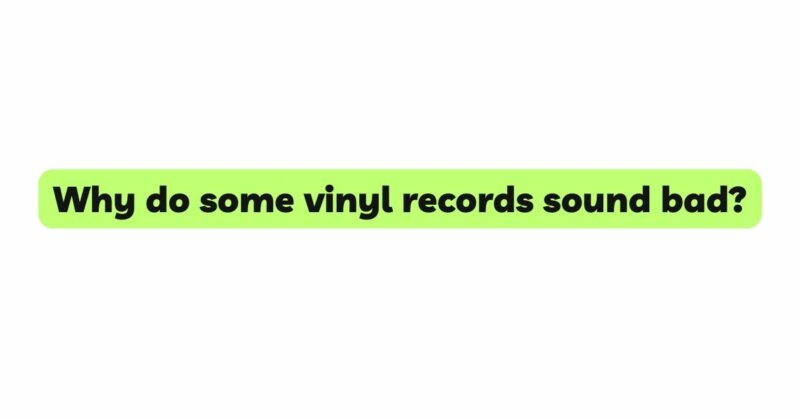As vinyl records continue to make a remarkable comeback in the modern music landscape, enthusiasts often praise the analog warmth and distinct sound of vinyl. However, it is not uncommon to encounter vinyl records that sound less than stellar, exhibiting poor sound quality that can be disappointing to both audiophiles and casual listeners alike. This article aims to delve into the reasons behind poor sound quality in vinyl records, exploring issues related to mastering, pressing, storage, handling, and playback equipment, as well as the impact of surface noise and imperfections on the overall listening experience.
- The Complexity of Vinyl Production:
Vinyl record production involves intricate processes, and a multitude of factors can impact sound quality. We’ll examine the challenges faced during cutting, plating, and pressing, and how each step can contribute to potential sound issues.
- The Role of Mastering:
Mastering for vinyl presents unique challenges compared to other formats. We’ll discuss how decisions made during the mastering process, such as dynamic range adjustments and frequency response considerations, can influence sound quality.
- Limitations of the Vinyl Format:
Vinyl records have inherent limitations in terms of frequency response and dynamic range. We’ll explore how these limitations can contribute to poor sound quality, particularly for songs with complex arrangements and wide dynamic ranges.
- Surface Noise and Imperfections:
Vinyl records are susceptible to surface noise and imperfections, which can significantly impact the listening experience. We’ll discuss how these factors contribute to poor sound quality in vinyl records.
- Quality Control Challenges:
With the resurgence of vinyl, there has been an increased demand for pressing plants. We’ll examine how issues related to quality control during manufacturing and pressing can lead to subpar sound quality in vinyl records.
- Environmental Factors:
Environmental conditions, such as temperature and humidity, can affect vinyl records’ physical integrity and sound quality. We’ll explore the impact of environmental factors on vinyl preservation and playback.
- Storage and Handling:
Proper storage and handling are crucial in maintaining the integrity of vinyl records. We’ll discuss how improper storage and mishandling can lead to deterioration and impact sound quality.
- Playback Equipment:
The quality of playback equipment, including turntables, cartridges, and speakers, can significantly influence the sound of vinyl records. We’ll examine how using subpar equipment may exacerbate sound issues.
- Vinyl Remasters and Reissues:
Remastering and reissuing songs for vinyl may introduce new challenges. We’ll discuss how these processes can impact the original sound and potentially contribute to poor sound quality in vinyl records.
- Surface Cleaning and Maintenance:
Regular cleaning and maintenance of vinyl records are essential for preserving sound quality. We’ll explore best practices for cleaning and caring for vinyl records to optimize their longevity and playback performance.
- The Subjectivity of Sound Perception:
Sound perception is subjective and varies among listeners. We’ll discuss how individual preferences, expectations, and listening environments can influence perceptions of vinyl sound quality.
- Addressing Poor Sound Quality:
Identifying and addressing poor sound quality in vinyl records require a systematic approach. We’ll discuss troubleshooting techniques and solutions for improving vinyl sound quality.
- The Appeal of Vinyl Despite Imperfections:
Despite potential sound issues, vinyl continues to captivate music enthusiasts. We’ll explore the enduring appeal of vinyl, which extends beyond technical perfection, and the emotional connection it fosters with the music.
- The Coexistence of Vinyl and Digital Formats:
Vinyl and digital formats can coexist, each offering distinct listening experiences. We’ll discuss how different formats cater to diverse preferences and how both contribute to the appreciation of music.
Conclusion:
Poor sound quality in vinyl records can result from a combination of factors related to mastering, pressing, storage, handling, playback equipment, and environmental conditions. Understanding these challenges is crucial in appreciating the nuances of vinyl records and optimizing their sound quality. While certain vinyl records may exhibit imperfections, the format’s enduring appeal lies in its analog warmth, emotional connection, and tangible music experience. As technology continues to advance, both vinyl and digital formats will coexist, allowing music enthusiasts to enjoy a diverse range of listening experiences, each offering its own unique qualities and charms. Ultimately, the preference for vinyl is a matter of personal taste, reflecting the individual’s values, connection to music, and desire for a more immersive and authentic musical journey.


